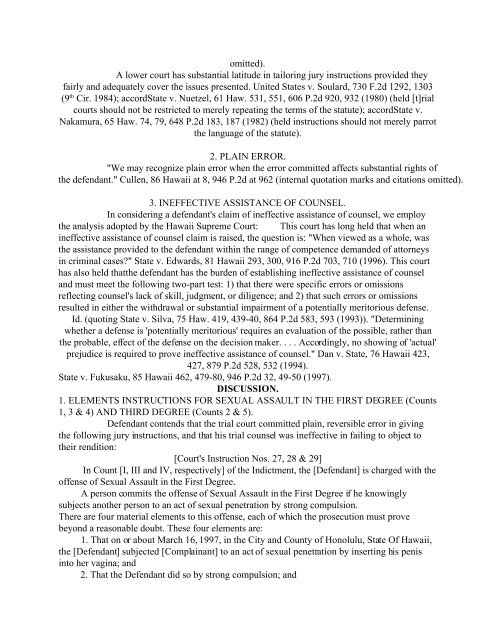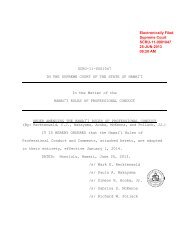standards of review. - State of Hawaii
standards of review. - State of Hawaii
standards of review. - State of Hawaii
Create successful ePaper yourself
Turn your PDF publications into a flip-book with our unique Google optimized e-Paper software.
omitted).<br />
A lower court has substantial latitude in tailoring jury instructions provided they<br />
fairly and adequately cover the issues presented. United <strong>State</strong>s v. Soulard, 730 F.2d 1292, 1303<br />
(9 th Cir. 1984); accord<strong>State</strong> v. Nuetzel, 61 Haw. 531, 551, 606 P.2d 920, 932 (1980) (held [t]rial<br />
courts should not be restricted to merely repeating the terms <strong>of</strong> the statute); accord<strong>State</strong> v.<br />
Nakamura, 65 Haw. 74, 79, 648 P.2d 183, 187 (1982) (held instructions should not merely parrot<br />
the language <strong>of</strong> the statute).<br />
2. PLAIN ERROR.<br />
"We may recognize plain error when the error committed affects substantial rights <strong>of</strong><br />
the defendant." Cullen, 86 <strong>Hawaii</strong> at 8, 946 P.2d at 962 (internal quotation marks and citations omitted).<br />
3. INEFFECTIVE ASSISTANCE OF COUNSEL.<br />
In considering a defendant's claim <strong>of</strong> ineffective assistance <strong>of</strong> counsel, we employ<br />
the analysis adopted by the <strong>Hawaii</strong> Supreme Court: This court has long held that when an<br />
ineffective assistance <strong>of</strong> counsel claim is raised, the question is: "When viewed as a whole, was<br />
the assistance provided to the defendant within the range <strong>of</strong> competence demanded <strong>of</strong> attorneys<br />
in criminal cases?" <strong>State</strong> v. Edwards, 81 <strong>Hawaii</strong> 293, 300, 916 P.2d 703, 710 (1996). This court<br />
has also held thatthe defendant has the burden <strong>of</strong> establishing ineffective assistance <strong>of</strong> counsel<br />
and must meet the following two-part test: 1) that there were specific errors or omissions<br />
reflecting counsel's lack <strong>of</strong> skill, judgment, or diligence; and 2) that such errors or omissions<br />
resulted in either the withdrawal or substantial impairment <strong>of</strong> a potentially meritorious defense.<br />
Id. (quoting <strong>State</strong> v. Silva, 75 Haw. 419, 439-40, 864 P.2d 583, 593 (1993)). "Determining<br />
whether a defense is 'potentially meritorious' requires an evaluation <strong>of</strong> the possible, rather than<br />
the probable, effect <strong>of</strong> the defense on the decision maker. . . . Accordingly, no showing <strong>of</strong> 'actual'<br />
prejudice is required to prove ineffective assistance <strong>of</strong> counsel." Dan v. <strong>State</strong>, 76 <strong>Hawaii</strong> 423,<br />
427, 879 P.2d 528, 532 (1994).<br />
<strong>State</strong> v. Fukusaku, 85 <strong>Hawaii</strong> 462, 479-80, 946 P.2d 32, 49-50 (1997).<br />
DISCUSSION.<br />
1. ELEMENTS INSTRUCTIONS FOR SEXUAL ASSAULT IN THE FIRST DEGREE (Counts<br />
1, 3 & 4) AND THIRD DEGREE (Counts 2 & 5).<br />
Defendant contends that the trial court committed plain, reversible error in giving<br />
the following jury instructions, and that his trial counsel was ineffective in failing to object to<br />
their rendition:<br />
[Court's Instruction Nos. 27, 28 & 29]<br />
In Count [I, III and IV, respectively] <strong>of</strong> the Indictment, the [Defendant] is charged with the<br />
<strong>of</strong>fense <strong>of</strong> Sexual Assault in the First Degree.<br />
A person commits the <strong>of</strong>fense <strong>of</strong> Sexual Assault in the First Degree if he knowingly<br />
subjects another person to an act <strong>of</strong> sexual penetration by strong compulsion.<br />
There are four material elements to this <strong>of</strong>fense, each <strong>of</strong> which the prosecution must prove<br />
beyond a reasonable doubt. These four elements are:<br />
1. That on or about March 16, 1997, in the City and County <strong>of</strong> Honolulu, <strong>State</strong> Of <strong>Hawaii</strong>,<br />
the [Defendant] subjected [Complainant] to an act <strong>of</strong> sexual penetration by inserting his penis<br />
into her vagina; and<br />
2. That the Defendant did so by strong compulsion; and
















